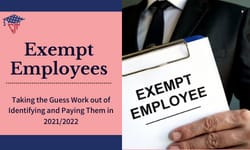Please note that events are moderated so there may be a delay between you posting it and your event being live on the site.

- This event has passed.
Exempt or Non-Exempt? How to Make the Right Call and Avoid Lawsuits
9 November 2021 |1:00 pm - 2:30 pm EST
179
DESCRIPTION
LIVE ONLINE TRAINING COURSE

 1.5 CEUs HRCI | 1.5 PDCs SHRM APPROVED
1.5 CEUs HRCI | 1.5 PDCs SHRM APPROVED
During the last decade or two, employers have found it increasingly difficult to decide which employees are entitled to overtime pay. Those classifications are commonly referred to as exempt employees (those who meet the FLSA’s requirements to be exempt from overtime pay) and non-exempt employees (employees the law requires to be paid overtime).
With a Democratic and pro-employee President now in office, these considerations become even more relevant – and pressing—for employers.
The FLSA contains dozens of exemptions, which basically provide that specific categories of employees and/or positions aren’t subject to the Act’s overtime requirements. Most common are the “white-collar” exemptions for executive, administrative, and professional employees, computer professionals, and outside sales employees.
Many employers think their employees are properly classified as overtime-exempt, only to find out that in fact they are improperly classified, and that their employees are entitled to back pay in the form of overtime pay and the same amount in liquidated damages. In other words, if you owe your employees any wages – either straight or overtime pay—you are on the hook, under the FLSA (federal law) for double that amount. If your employees work in a State with even more stringent wage and hour laws, you could end up paying more.
Wage and hour law in general, and employee classification in particular is very tricky, very nuanced, and contains many pitfalls for even those employers who are otherwise knowledgeable and well-intentioned.
So what are the overtime exemptions exactly? Who qualifies? What must you do to make sure that your employees are properly classified, and, most importantly how can you make sure that your practices comply with the Fair Labor Standards Act so you do not fall prey to a Department of Labor audit – or worse, a lawsuit—resulting in unpaid overtime, liquidated damages, other fines and penalties in addition to your legal fees? Join this webinar and find out!
SESSION HIGHLIGHTS:
- Difference between exempt vs non-exempt employees
- The salary basis test
- The most common exemption categories
- The duties test
- Job Titles and Descriptions
- Discretion
- Supervision
- Authority
- Case examples: Pharma sales reps, Financial services employees
Why You Should Attend:
In this webinar, our expert speaker Janette Levey Frisch will help you to understand how to properly classify exempted and non-exempted employees under the FLSA act. She will also help you to understand what does the term “exempted employee” really means? And what you can do to make sure that your practices comply with the Fair Labor Standards Act, (When it comes to the proper classification of employees) so you do not fall prey to the Department of Labor audit.
Who Should Attend:
- All Employers
- Business Owners
- Company Leadership
- Compliance professionals
- Payroll Administrators
- HR Professionals
- Compliance Professionals
- Managers/Supervisors
- Employers in all industries
During the Q&A session following the live event, ask a question, and get a direct response from our expert speaker.
Note: You will get access to the Recording link and E-Transcript; in your account and at your registered email address, in the next 2 -3 days once the webinar is accomplished.